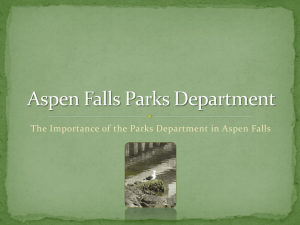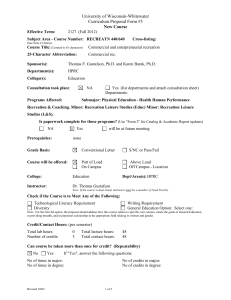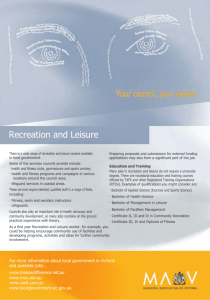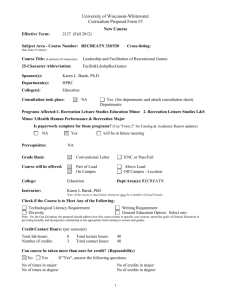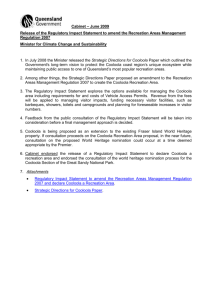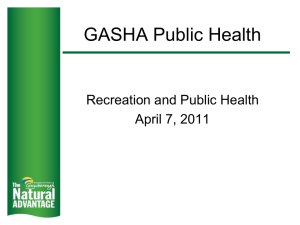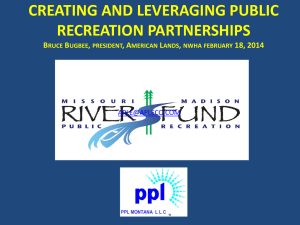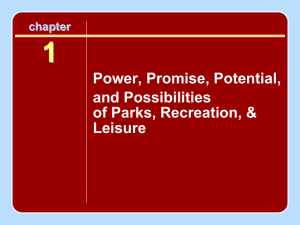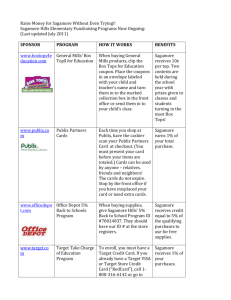recreatn 650 - University of Wisconsin Whitewater
advertisement
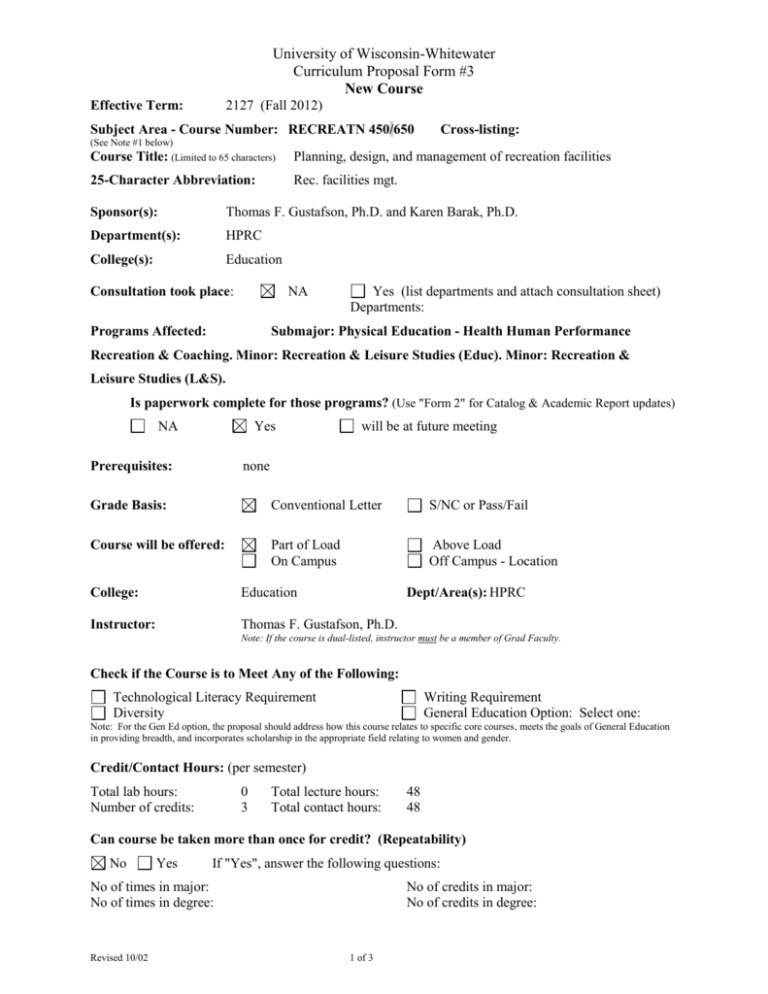
University of Wisconsin-Whitewater Curriculum Proposal Form #3 New Course Effective Term: 2127 (Fall 2012) Subject Area - Course Number: RECREATN 450/650 Cross-listing: (See Note #1 below) Course Title: (Limited to 65 characters) Planning, design, and management of recreation facilities 25-Character Abbreviation: Rec. facilities mgt. Sponsor(s): Thomas F. Gustafson, Ph.D. and Karen Barak, Ph.D. Department(s): HPRC College(s): Education Consultation took place: NA Programs Affected: Yes (list departments and attach consultation sheet) Departments: Submajor: Physical Education - Health Human Performance Recreation & Coaching. Minor: Recreation & Leisure Studies (Educ). Minor: Recreation & Leisure Studies (L&S). Is paperwork complete for those programs? (Use "Form 2" for Catalog & Academic Report updates) NA Yes Prerequisites: will be at future meeting none Grade Basis: Conventional Letter S/NC or Pass/Fail Course will be offered: Part of Load On Campus Above Load Off Campus - Location College: Education Dept/Area(s): HPRC Instructor: Thomas F. Gustafson, Ph.D. Note: If the course is dual-listed, instructor must be a member of Grad Faculty. Check if the Course is to Meet Any of the Following: Technological Literacy Requirement Diversity Writing Requirement General Education Option: Select one: Note: For the Gen Ed option, the proposal should address how this course relates to specific core courses, meets the goals of General Education in providing breadth, and incorporates scholarship in the appropriate field relating to women and gender. Credit/Contact Hours: (per semester) Total lab hours: Number of credits: 0 3 Total lecture hours: Total contact hours: 48 48 Can course be taken more than once for credit? (Repeatability) No Yes If "Yes", answer the following questions: No of times in major: No of times in degree: Revised 10/02 No of credits in major: No of credits in degree: 1 of 3 Proposal Information: (Procedures for form #3) Course justification: This course has been piloted as a special studies course and is ready to enter the curriculum as a regular course offering. Relationship to program assessment objectives: The recreation/leisure studies program recently hired additional faculty to increase program offerings which has been a program objective. In addition, converting special studies classes to traditional format is a current objective of the program. Budgetary impact: None. This course is currently being taught as a special studies course. Course description: (50 word limit) This course will introduce management theories and provide practical experience in the design, development, operation, maintenance, and administration of various recreation facilities. If dual listed, list graduate level requirements for the following: 1. Content (e.g., What are additional presentation/project requirements?) Graduate students will plan and create a recreation/sport facility of their choice. They will complete a literature review of facility design, acquire skills in Turbo CAD (Computer Aided Design) or an equivalent program and provide a physical layout of the facility. Student will then provide a management plan to include a feasibility study, organizational structure, and marketing plan. A presentation to the class will accompany the written product. 2. Intensity (e.g., How are the processes and standards of evaluation different for graduates and undergraduates?) Evaluation of the graduate project is unique, and 30% of the graduate grade is weighted to the graduate project. 3. Self-Directed (e.g., How are research expectations differ for graduates and undergraduates?) Review of literature to support facility design and management plan are above and beyond the undergraduate expectations. Students are allowed to focus on a facility related to their own professional goals for development. Course objectives and tentative course syllabus: See attached syllabus Bibliography: (Key or essential references only. Normally the bibliography should be no more than one or two pages in length.) Fried, G. (2005). Managing Sport Facilities. Human Kinetics: Champaign, IL. Revised 10/02 2 of 3 Harper, J. (2009). Planning for Recreation and Parks Facilities: Predesign Process, Principles, and Strategies. Venture Publishing: State College, PA. Fawcett, (2005). Aquatic Facility Management. Human Kinetics, Champaign, IL Griffiths, T. (2003). The Complete Swimming Pool Guide. Sagamore Publishing, Champaign, IL. Harper, J. (2009). Planning for Recreation and Parks Facilities: Predesign Process, Principles, and Strategies. Venture Publishing, State College, PA. Hultsman, J. Cottrell, R.L. & Hultsman, W.Z. (1998). Planning Parks for People. Venture Publishing, State College, PA. Kraus, R.G. & Curtis, J.E. (2000). Creative Management in Recreation, Parks, and Leisure. Services. McGraw-Hil, Boston, MA. National Intramural and Recreation Sport Association (2009). Space Planning Guidelines for Campus Recreation Sports Facilities. Human Kinetics, Champaign, IL. Peterson, J. Hronek, B.B. & Garges, J. (2008). Risk Management for Parks, Recreation, and Leisure Services. Sagamore Publishing, Champaign, Il. Sawyer, T.H. (2009). Facility Planning and Design for Health, Physical Activity, Recreation, and Sport. Sagamore Pubishing: Champaign, IL. Sawyer, T.H. (2009). Facility Management for Physical Activity and Sport. Sagamore Publishing, Champaign, IL. Thompson, D. Hudson, S.D. & Olsen, H.M. ((2007). S.A.F.E. Play Areas: Creation, Maintenance, and Renovation. Human Kinetics, Champaign, IL. Warren, R. Rea, P. & Payne, S. (2007). Park and Recreation Maintenance Management. Sagamore Publishing: Champaign, IL. Whyman, W. (2008). Outdoor Site and Facility Management. Human Kinetics, Champaign, IL. Revised 10/02 3 of 3
